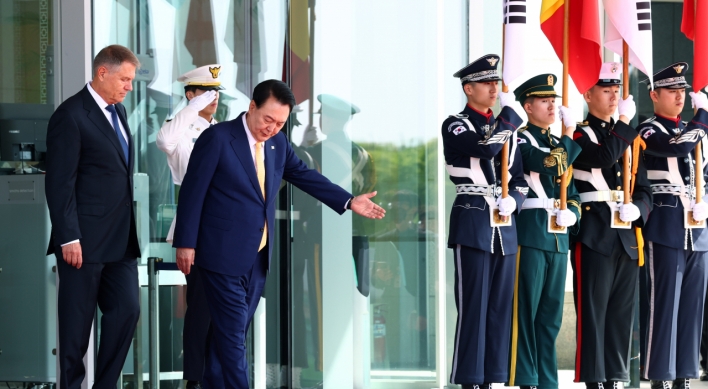[Robert J. Fouser] Managing expectations for the upcoming summits
By Robert J. FouserPublished : April 24, 2018 - 17:38
 This Friday President Moon Jae-in and North Korean leader Kim Jong-un will meet for the first time. Expectations are running high that the summit will start a process that leads to peace and eventual reunification of the divided people. These high expectations come after years of tension that escalated sharply in 2017 after a series of North Korean nuclear and ballistic missile tests. Expectations are also running high that the proposed meeting between Kim Jong-un and US President Donald Trump will continue the peace process.
This Friday President Moon Jae-in and North Korean leader Kim Jong-un will meet for the first time. Expectations are running high that the summit will start a process that leads to peace and eventual reunification of the divided people. These high expectations come after years of tension that escalated sharply in 2017 after a series of North Korean nuclear and ballistic missile tests. Expectations are also running high that the proposed meeting between Kim Jong-un and US President Donald Trump will continue the peace process.High expectations are a good thing, but they also raise the prospect of dashed hopes that could throw the peace process off track. The history of false starts on the Korean Peninsula is long and the distrust is deep. Why, then, are expectations so high? And what do they mean?
Several things have come together to raise expectations. The election of Moon Jae-in in May 2017 raised hopes in South Korea that the new administration would reach out to North Korea and take a more activist stance on diplomacy. Though distrust runs high, the idea of talking with North Korea has long been popular in South Korea. President Moon dealt deftly with the rising tensions last year and has earned public trust in South Korea.
President Trump’s acceptance of a Kim Jong-un’s invitation to meet immediately raised expectations and created the perception that “this time is different.” Trump’s sudden change in stance and the historic significance of the meeting have fed the perception that real change is afoot. Trump has repeatedly said that he would not meet Kim without denuclearization. Continued preparations for the meeting imply that that condition will be met.
Kim Jong-un, meanwhile, has raised expectations steadily since he announced that North Korea would participate in the PyeongChang Olympics. Like Trump, he has been perceived as erratic, and any change in stance is taken as a dramatic step forward. He invested vast resources in pushing the nuclear weapons and ballistic missile programs, so agreeing to meet Trump is seen as a sign that he maybe willing to give up the weapons in exchange for something else.
The heart of diplomacy, of course, is not about expectations, but results. To move the peace process forward, the meetings have to produce results that meet the competing needs of the various parties. The results, however, do not have to be immediate and they may require a series of meetings to produce. The 1972 summit between Richard Nixon and Mao Zedong for example, did not lead to a normalization of relations until 1978.
Diplomacy is also about power and the more powerful party always has the advantage. In the upcoming negotiations, North Korea is the weaker party despite its nuclear weapons and ballistic missile programs. Its economy is weak and market reforms in recent years have raised expectations, which in turn has created a new source of political instability.
South Korea, by contrast, is much stronger. It has a highly developed economy and has become a stable democracy. To be sure, South Korea faces a number of challenges, but they are similar to other advanced countries. South Koreans perceive their nation as weak because of the Korean War and the longstanding security relationship with the US.
The United States remains the most powerful of all parties. For all the talk of “American decline,” the US has vast economic and military resources to draw on. It is the only nation with the power to enforce its will on the Korean Peninsula. Trump knows this and appears willing to use US power to get what he wants. He also knows that Russia and China will not risk war over North Korean weapons programs.
The question of the US power is key to the upcoming summits. Is Donald Trump really willing to use US military power to enforce denuclearization? How does North Korea perceive his intentions? To date, North Korea’s actions suggest that it believes that Trump is not bluffing and that it wants to make a deal. Its actions also suggest that it knows that it is weak and wants to drive a wedge between South Korea and the US to get leverage in the negotiations with the US.
If the summits start a process of verifiable denuclearization in exchange in exchange for measures that will help the North Korean economy develop, then they will go down in history as a great success. If, on the other hand, they produce photo ops without a clear path toward denuclearization, then the tensions of 2017 will return.
Robert J. Fouser
Robert J. Fouser, a former associate professor of Korean language education at Seoul National University, writes on Korea from Pawtucket, Rhode Island. He can be reached at robertjfouser@gmail.com. -- Ed.


![[AtoZ into Korean mind] Humor in Korea: Navigating the line between what's funny and not](http://res.heraldm.com/phpwas/restmb_idxmake.php?idx=644&simg=/content/image/2024/04/22/20240422050642_0.jpg&u=)




![[Herald Interview] Why Toss invited hackers to penetrate its system](http://res.heraldm.com/phpwas/restmb_idxmake.php?idx=644&simg=/content/image/2024/04/22/20240422050569_0.jpg&u=20240422150649)

![[Graphic News] 77% of young Koreans still financially dependent](http://res.heraldm.com/phpwas/restmb_idxmake.php?idx=644&simg=/content/image/2024/04/22/20240422050762_0.gif&u=)




![[Exclusive] Korean military set to ban iPhones over 'security' concerns](http://res.heraldm.com/phpwas/restmb_idxmake.php?idx=652&simg=/content/image/2024/04/23/20240423050599_0.jpg&u=)



